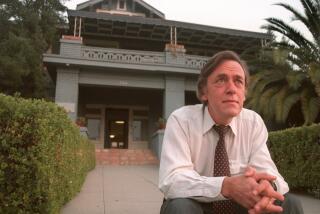Public Interest Law Center Reorganizing
- Share via
The Los Angeles-based Center for Law in the Public Interest, which pioneered land-use and environmental law in California, plans to split itself into a private law firm and a smaller nonprofit center, two founders say, to ensure the organization’s survival.
The reorganization, expected by Labor Day, was prompted by increasing difficulty in fund raising and in obtaining fees awarded by courts for winning rulings that benefit the public, founder Carlyle W. Hall Jr. said.
“At the moment, we don’t have a financial problem,” Hall said. “But any given case can cost a quarter- to half-a-million dollars to pursue. The law of averages is that you are going to start losing some of these, and you are going to be putting your finances into jeopardy. We want to minimize those risks.”
Obtaining court-awarded fees, a sizable part of Public Interest’s budget, from an increasingly conservative judiciary is becoming riskier, Hall said. Grants and donations, which financed the rest of the center’s budget, also are dwindling, he said.
The reorganization is being watched by struggling public-interest law offices across the country as a model for their own economic future.
Numerous such offices have suffered and many ceased to exist during the 1980s because of the Reagan Administration’s severe curtailment of federal funding and greater competition for dwindling charitable donations.
Hall, 45, said creating the private law firm of Hall and Phillips with co-founder John R. Phillips, 46, will allow the lawyers to accept cases from clients able to pay fees.
He said potential clients include cities suing counties over environmental problems or defending themselves against oil company litigation, and groups of professional women hoping to achieve the same kind of affirmative hiring plans with employers that the center has won for women against police and fire departments.
Even groups like the Sierra Club, Hall said, can often afford to pay.
Hall estimated that one-third to one-half of the new firm’s cases will garner fees. He said the remainder of the law firm’s efforts will be devoted to the center’s cases.
Under Internal Revenue Service rules and a special waiver, Hall said, the center has been restricted to collecting no more than 60% of its budget from court-ordered fees billed to losing opponents and cannot charge fees to clients.
He said the center, which drafted the 1977 state legislation authorizing judges to grant the fees for so-called “private attorney generals” acting for the public’s benefit, has been successful in winning the maximum allowable over the last decade. For example, the center has collected about $3.8 million for 16 years of work on the Century Freeway case.
But both founders said obtaining the fees from an increasingly conservative judiciary is becoming riskier, and they wanted to find a more dependable source of income for the future.
Donations from foundations and individuals are also dwindling, they said, because of increased competition from legal services offices and others that have lost federal funding.
The Ford Foundation was the center’s primary benefactor from 1971 until 1979, when it provided a terminal grant of $1 million.
Created in 1971 by four young associates who met at the prestigious Los Angeles law firm of O’Melveny & Myers, the Los Angeles-based center has:
- Won the state Supreme Court ruling that shaped the California Environmental Quality Act of 1970 by requiring environmental impact reports for all public and private projects with a potential effect on the environment, and used that decision to block or alter several developments, including the proposed Palmdale International Airport.
- Temporarily halted construction of the 17-mile Century Freeway between Los Angeles International Airport and Watts-Willowbrook and won $400 million for low-income housing and a $17-million rail rapid transit line in connection with the freeway’s development.
The center will be run by Executive Director Ruth Lehrer, with guidance from the current board of trustees. It will concentrate on fund raising and selection of public-interest cases to be pursued.
The new law firm, Hall said, will remain in the center’s quarters at 10951 W. Pico Blvd., while the smaller center will rent offices elsewhere. He said all 16 current employees, including the four lawyers working with the founders, have been invited to join one of the two new entities.
More to Read
Sign up for Essential California
The most important California stories and recommendations in your inbox every morning.
You may occasionally receive promotional content from the Los Angeles Times.













